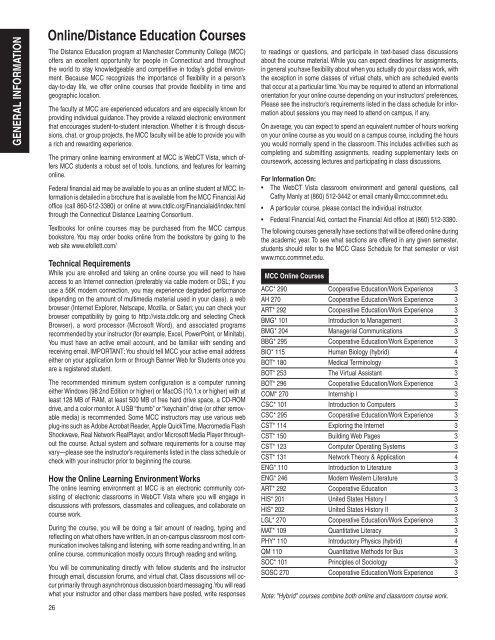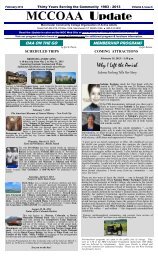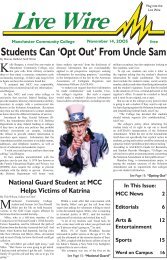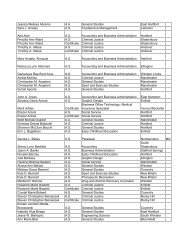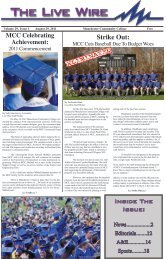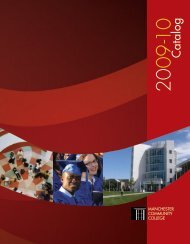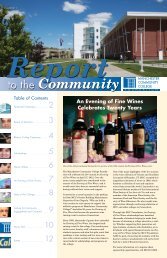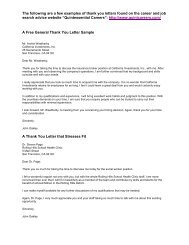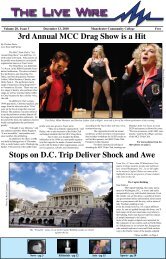Liberal Arts and Science - Manchester Community College ...
Liberal Arts and Science - Manchester Community College ...
Liberal Arts and Science - Manchester Community College ...
You also want an ePaper? Increase the reach of your titles
YUMPU automatically turns print PDFs into web optimized ePapers that Google loves.
GENERAL INFORMATION<br />
Online/Distance Education Courses<br />
The Distance Education program at <strong>Manchester</strong> <strong>Community</strong> <strong>College</strong> (MCC)<br />
offers an excellent opportunity for people in Connecticut <strong>and</strong> throughout<br />
the world to stay knowledgeable <strong>and</strong> competitive in today’s global environment.<br />
Because MCC recognizes the importance of flexibility in a person’s<br />
day-to-day life, we offer online courses that provide flexibility in time <strong>and</strong><br />
geographic location.<br />
The faculty at MCC are experienced educators <strong>and</strong> are especially known for<br />
providing individual guidance. They provide a relaxed electronic environment<br />
that encourages student-to-student interaction. Whether it is through discussions,<br />
chat, or group projects, the MCC faculty will be able to provide you with<br />
a rich <strong>and</strong> rewarding experience.<br />
The primary online learning environment at MCC is WebCT Vista, which offers<br />
MCC students a robust set of tools, functions, <strong>and</strong> features for learning<br />
online.<br />
Federal financial aid may be available to you as an online student at MCC. Information<br />
is detailed in a brochure that is available from the MCC Financial Aid<br />
office (call 860-512-3380) or online at www.ctdlc.org/Financialaid/index.html<br />
through the Connecticut Distance Learning Consortium.<br />
Textbooks for online courses may be purchased from the MCC campus<br />
bookstore. You may order books online from the bookstore by going to the<br />
web site www.efollett.com/<br />
Technical Requirements<br />
While you are enrolled <strong>and</strong> taking an online course you will need to have<br />
access to an Internet connection (preferably via cable modem or DSL; if you<br />
use a 56K modem connection, you may experience degraded performance<br />
depending on the amount of multimedia material used in your class), a web<br />
browser (Internet Explorer, Netscape, Mozilla, or Safari; you can check your<br />
browser compatibility by going to http://vista.ctdlc.org <strong>and</strong> selecting Check<br />
Browser), a word processor (Microsoft Word), <strong>and</strong> associated programs<br />
recommended by your instructor (for example, Excel, PowerPoint, or Minitab).<br />
You must have an active email account, <strong>and</strong> be familiar with sending <strong>and</strong><br />
receiving email. IMPORTANT: You should tell MCC your active email address<br />
either on your application form or through Banner Web for Students once you<br />
are a registered student.<br />
The recommended minimum system configuration is a computer running<br />
either Windows (98 2nd Edition or higher) or MacOS (10.1.x or higher) with at<br />
least 128 MB of RAM, at least 500 MB of free hard drive space, a CD-ROM<br />
drive, <strong>and</strong> a color monitor. A USB “thumb” or “keychain” drive (or other removable<br />
media) is recommended. Some MCC instructors may use various web<br />
plug-ins such as Adobe Acrobat Reader, Apple QuickTime, Macromedia Flash<br />
Shockwave, Real Network RealPlayer, <strong>and</strong>/or Microsoft Media Player throughout<br />
the course. Actual system <strong>and</strong> software requirements for a course may<br />
vary—please see the instructor’s requirements listed in the class schedule or<br />
check with your instructor prior to beginning the course.<br />
How the Online Learning Environment Works<br />
The online learning environment at MCC is an electronic community consisting<br />
of electronic classrooms in WebCT Vista where you will engage in<br />
discussions with professors, classmates <strong>and</strong> colleagues, <strong>and</strong> collaborate on<br />
course work.<br />
During the course, you will be doing a fair amount of reading, typing <strong>and</strong><br />
reflecting on what others have written. In an on-campus classroom most communication<br />
involves talking <strong>and</strong> listening, with some reading <strong>and</strong> writing. In an<br />
online course, communication mostly occurs through reading <strong>and</strong> writing.<br />
You will be communicating directly with fellow students <strong>and</strong> the instructor<br />
through email, discussion forums, <strong>and</strong> virtual chat. Class discussions will occur<br />
primarily through asynchronous discussion board messaging. You will read<br />
what your instructor <strong>and</strong> other class members have posted, write responses<br />
26<br />
to readings or questions, <strong>and</strong> participate in text-based class discussions<br />
about the course material. While you can expect deadlines for assignments,<br />
in general you have flexibility about when you actually do your class work, with<br />
the exception in some classes of virtual chats, which are scheduled events<br />
that occur at a particular time. You may be required to attend an informational<br />
orientation for your online course depending on your instructors’ preferences.<br />
Please see the instructor’s requirements listed in the class schedule for information<br />
about sessions you may need to attend on campus, if any.<br />
On average, you can expect to spend an equivalent number of hours working<br />
on your online course as you would on a campus course, including the hours<br />
you would normally spend in the classroom. This includes activities such as<br />
completing <strong>and</strong> submitting assignments, reading supplementary texts on<br />
coursework, accessing lectures <strong>and</strong> participating in class discussions.<br />
For Information On:<br />
• The WebCT Vista classroom environment <strong>and</strong> general questions, call<br />
Cathy Manly at (860) 512-3442 or email cmanly@mcc.commnet.edu.<br />
• A particular course, please contact the individual instructor.<br />
• Federal Financial Aid, contact the Financial Aid office at (860) 512-3380.<br />
The following courses generally have sections that will be offered online during<br />
the academic year. To see what sections are offered in any given semester,<br />
students should refer to the MCC Class Schedule for that semester or visit<br />
www.mcc.commnet.edu.<br />
MCC Online Courses<br />
ACC* 290 Cooperative Education/Work Experience 3<br />
AH 270 Cooperative Education/Work Experience 3<br />
ART* 292 Cooperative Education/Work Experience 3<br />
BMG* 101 Introduction to Management 3<br />
BMG* 204 Managerial Communications 3<br />
BBG* 295 Cooperative Education/Work Experience 3<br />
BIO* 115 Human Biology (hybrid) 4<br />
BOT* 180 Medical Terminology 3<br />
BOT* 253 The Virtual Assistant 3<br />
BOT* 296 Cooperative Education/Work Experience 3<br />
COM* 270 Internship I 3<br />
CSC* 101 Introduction to Computers 3<br />
CSC* 295 Cooperative Education/Work Experience 3<br />
CST* 114 Exploring the Internet 3<br />
CST* 150 Building Web Pages 3<br />
CST* 123 Computer Operating Systems 3<br />
CST* 131 Network Theory & Application 4<br />
ENG* 110 Introduction to Literature 3<br />
ENG* 246 Modern Western Literature 3<br />
ART* 292 Cooperative Education 3<br />
HIS* 201 United States History I 3<br />
HIS* 202 United States History II 3<br />
LGL* 270 Cooperative Education/Work Experience 3<br />
MAT* 109 Quantitative Literacy 3<br />
PHY* 110 Introductory Physics (hybrid) 4<br />
QM 110 Quantitative Methods for Bus 3<br />
SOC* 101 Principles of Sociology 3<br />
SOSC 270 Cooperative Education/Work Experience 3<br />
Note: "Hybrid" courses combine both online <strong>and</strong> classroom course work.


